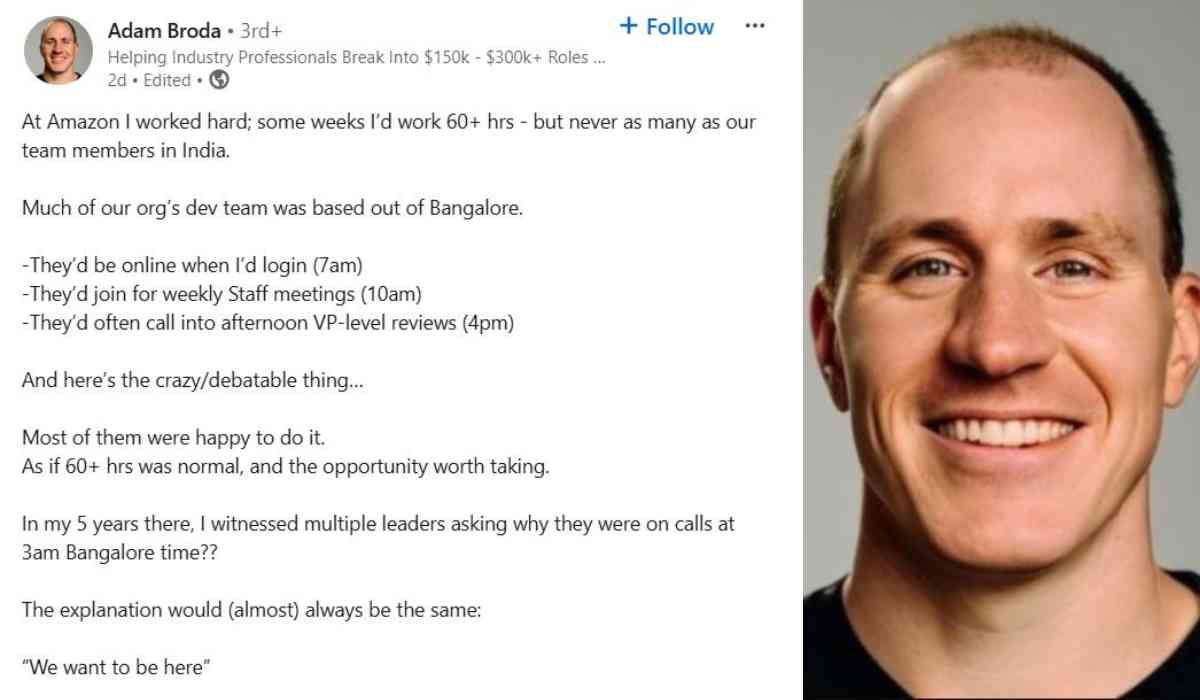Ex-Amazon executive, Adam Broda, has shared a post on his LinkedIn questioning what is normal in Indian work culture. Observing his colleagues' work timings, he found a ‘crazy/debatable’ part where Indian employees find 60+ hours of work to be normal.
Broda noticed a pattern among his Indian colleagues based in Bangalore. These team members consistently showed their dedication, regularly participating in meetings ranging from early morning to late evening hours in their time zone.
Can someone fix a toxic work culture? Read an interesting piece here
Considering the varied time zones, it makes sense working at uncomfortable timings. But Broda’s post digs out deeper concerns about the systemic impact of these work patterns. The issue isn’t just about accommodating occasional time differences – it’s about the normalization of consistently scrutinizing work schedules that have become deeply embedded in Indian corporate culture.
General Response By Indian Employees: “We want to be here”
“At Amazon, I worked hard - some weeks I’d work 60+ hours, but never as many as our team members in India,” Broda shared. He noted that his Indian colleagues would be available during his 7 AM login, attend 10 AM staff meetings, and actively participate in 4 PM VP-level reviews, despite the extensive time zone differences.
What particularly shocked Broda was the willingness to accept these demanding schedules. When questioned about attending calls at 3 AM Bangalore time, the response was consistently simple yet profound: “We want to be here.” This dedication, while admirable, raises important questions about work-life balance and sustainable professional practices.
What does the reality of Indian Work Culture look like?
Broda’s mind instantly was drawn to ask two specific questions to the response
1. Was that true, and if so, why?
2. At what point did their desire to work cross a line?
Many commenters have shared their perspective on the complex reality behind this willing participation in long working hours. One professional noted, “It’s not a good culture. Many need the job so they’ll bend over backwards. It’s sad actually. What happened to work-life balance or it does not exist in India?”
Another perspective shed light on the actual working conditions in India, suggesting that the reality might be even more demanding than presented. “Most companies have a 6-day work culture in India with 9-hour workdays as standard. This doesn’t even account for additional weekend work and night shifts,” shared another commenter.
Conclusion Drawn From Adam Broda’s LinkedIn Post
Broda’s observations touch upon many fragile aspects of Indian work culture - the intricate relationship between professional opportunity and personal sacrifice. While he acknowledges the enthusiasm and dedication of Indian professionals, he also raises important questions about the sustainability of such practices.
The discussion highlights the need for workplaces to maintain regular check-ins with international colleagues. To ensure their working hours remain healthy and sustainable, even when team members show willingness to work extended hours.
As global workplace cultures continue to expand and change, this conversation opens up important dialogues about finding the right balance. Knowing how to manage professional and personal well-being in the Indian corporate sector.
With inputs from agencies
Image Source: Multiple agencies
*The views expressed are personal to the author and do not reflect the platform's opinion of the same.
© Copyright 2024. All Rights Reserved Powered by Vygr Media.
Author;s Bio
A human figuring out the value of existence.























